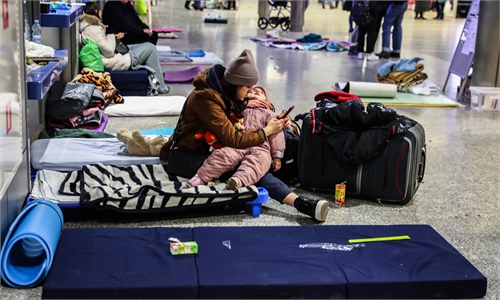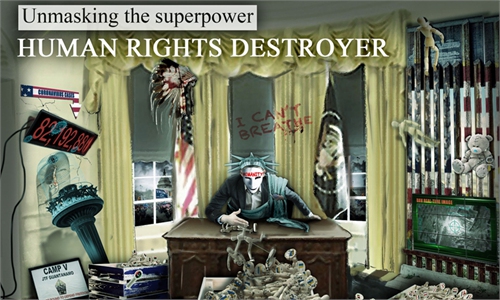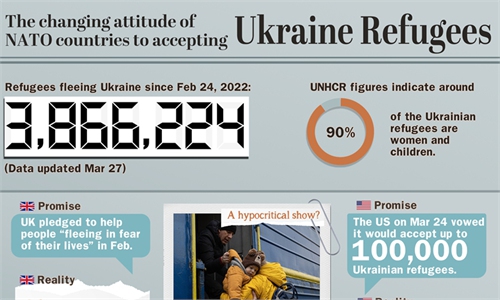IN-DEPTH / IN-DEPTH
UK's controversial refugee policies cause double standards and human rights concerns similar to the US
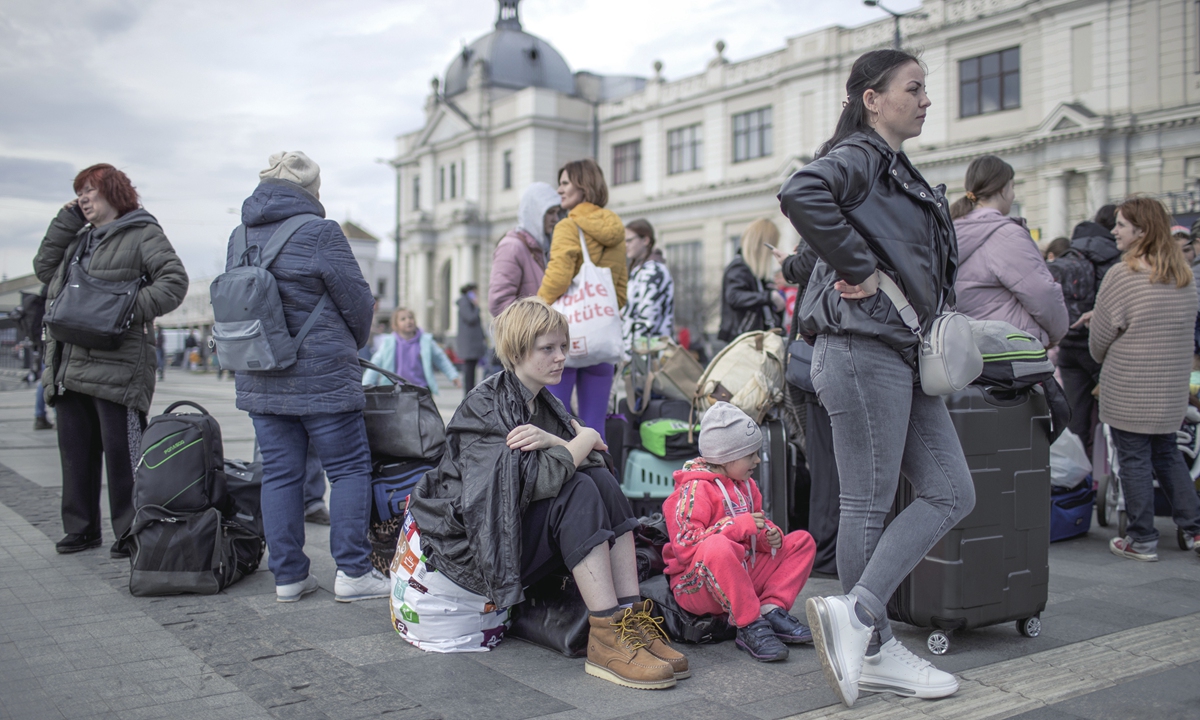
Ukrainian refugees are seen at a train station in Lviv, Ukraine on April 8, 2022.?Photo: IC
The UK's relative lack of urgency, buck-passing, and insufficiency in the management of the recent wave of border-crossing Ukrainian refugees was largely criticized, as its lip-service has exposed its political calculation and hypocrisy which are also evident in its controversial history of dealing with refugee crises.
Great Britain has closely followed the US lead in stoking the flames of the Russia-Ukraine conflict but quibbled about responsibilities and costs, backpedaling its promise under the domestic debate and political pressure, experts noted.
The Global Times will publish a two-part series focusing on the mishandling of the refugee crisis in Britain and Australia, two loyal followers of the US, which will offer a glimpse of the hypocrisy and double standards of this white-supremacist political community. The AUKUS clique is most likely to cause unrest worldwide and be more prone to buck-passing when dealing with troubles, as experts say. This is part one of the series written by GT staff reporters.
UK's lip service and buck-passing in refugee management
The UK has granted only 2,700 visas under its much-advertised Homes for Ukraine sponsorship scheme more than two weeks after its launch, according to figures from the Home Office released on March 30.
Other 22,800 visas were issued to Ukrainian refugees as the end of March under UK's other "Ukraine Family Scheme," launched on March 14 to allow individuals, charities, and businesses to bring Ukrainians - including those with no family ties to the UK - to safety, The Guardian reported. But the schemes were labeled "shambolic" by volunteers.
However, the UK retains a visa requirement on security grounds while other European countries have waived such requirements in response to the humanitarian crisis, Sky News reported.
The UK's home secretary was denounced by Ian Blackford, the Westminster leader of the Scottish National Party, for the "slowest, most bureaucratic, and incompetent refugee responses in the whole of Europe " in parliament in March.
Ukrainians who fled to Poland feel deterred by UK's complex rules, denouncing its visa regulations, which have been lifted by many other EU countries, as a means "to ensure Ukrainians do not come to the UK," as refugees were quoted as saying by The Guardian.
Refugees arriving at Warsaw's central station told The Guardian that they were baffled by the rules of the UK government that require a sponsor in Britain before applying for a visa, which could take weeks to be processed. None said they knew anyone in the UK who could sponsor them. Domestic media and refugee charities tagged the government's policy as "vague and insufficient."
"Seven hundred and sixty visa approvals in two weeks are disgraceful. In that time Poland has taken over 1.2 million refugees. Hungary has taken 190,000 refugees. Germany has taken over 50,000 refugees. Italy has over 17,000 refugees. Ireland, a country of just over 5 million people, has given sanctuary to three times as many refugees as the UK," Ian said.
French Interior Minister Gérald Darmanin decried the UK's "totally inadequate response" and "lack of humanity" toward Ukrainian refugees, while Ukrainian Ambassador to the UK Vadym Prystaiko also bemoaned "bureaucratic hassles" during a hearing of the UK's Home Affairs Committee.
"Despite all the grand statements[…] the British government continued to apply current rules that meant they did not welcome Ukrainian refugees who wanted to reach Britain," French President Emmanuel Macron upbraided the UK after an emergency EU summit on March 11, Sky News reported.
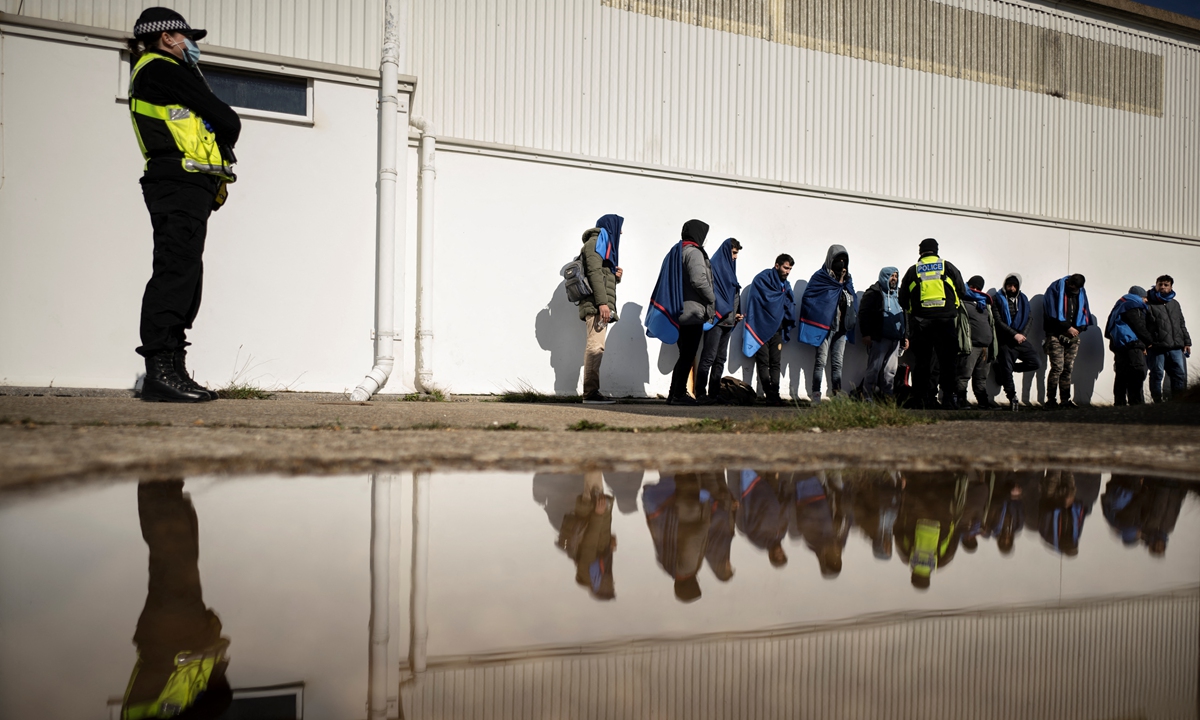
A police officer stands guard as migrants, picked up at sea attempting to cross the English Channel, in Dungeness, on the southeast coast of England, on March 15, 2022. Photo: AFP
Britain's hard-line stance on refugee resettlements stands in stark contrast to its flames-stoking in the Russia-Ukraine conflict at the heels of Washington.
In fact, the US and the UK repeatedly waged wars abroad that have resulted in numerous refugees. Yet when it comes to resettling them, they strategically pass the buck.
The British government has been accused of trading people like commodities after it unveiled a controversial plan to send asylum seekers on a one-way ticket 6,000 kilometers away to Rwanda, Al Jazeera reported on April 15.
The decision drew massive disagreement with some charities blasting it as "cruel," "inhumane" and "neo-colonial."
The British government was also questioned for its incapacity to take good care of human rights and safety of fleeing women, as the UN refugee agency has called on the UK government to intervene to stop single British men from being matched up with lone Ukrainian female refugees over the concerns of sexual exploitation.
Some social media posts recently showed that British men are using the Homes for Ukraine scheme to sexually target Ukrainian women.
Louise Calvey, head of security at the charity Refugee Action, told The Observer that the scheme was at risk of being a "Tinder for sex traffickers."
The performance of The UK in dealing with the Ukraine refugee crisis has reflected how Ukraine is a pawn following the geopolitical interests of Western countries like the UK and the US. Therefore, the Ukrainian humanitarian crisis is far from the first consideration of politicians in Western countries, Mao Junxiang, executive director and professor at the Human Rights Studies Center of the Central South University, told the Global Times on Monday.
Double standards and racial disparities
The white supremacy ideology of some British politicians has also been on display in the Ukrainian refugee crisis, observers said, as they were accused of employing "double standards" over the treatment of refugees of different races and regions, experts find.
Though there is much red tape in the UK to get Ukraine refugees into the country, many critics revealed that the UK shows more sympathy to the Ukrainians than the Afghans and the Iraqis.
Racism was seen among some politicians and in some European countries where fleeing Ukrainians are being welcomed while asylum seekers from countries like Nigeria, India, and Lebanon were deterred.
British politician and columnist Daniel Hannan came under fire after he said he felt shocked by Ukrainians fleeing their hometown as they "seem so like us," and the columnist described the conflict in Ukraine as a war that "is no longer something visited upon impoverished and remote populations."
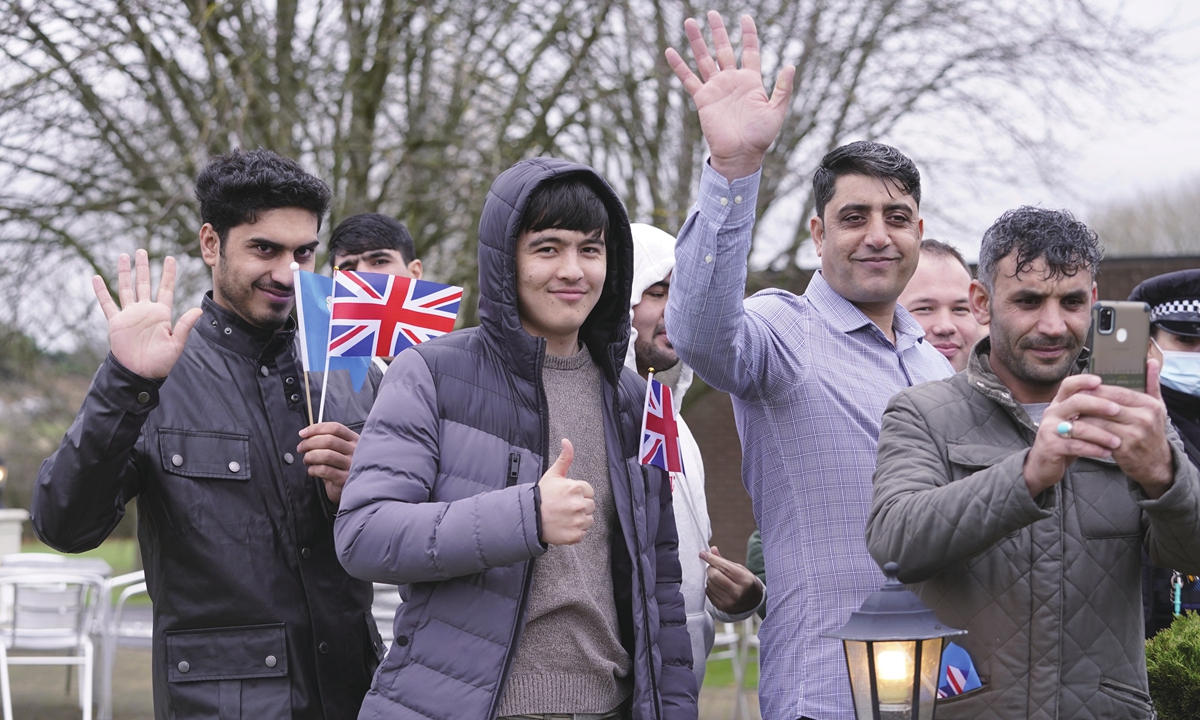
Refugees wave after Britain's Prince William (not in picture) meeting with refugees evacuated from Afghanistan in Leeds, the UK on November 30, 2021.?Photo: IC
European countries adopted a fairly different treatment for refugees from Ukraine and other regions such as Africa, Asia, and the Middle East, as public discourse in some countries is often tainted by racist and xenophobic rhetoric about refugees and migrants and they adopted hostile policies like border push-backs and draconian detention measures, said a paper published on March 2 by a Geneva-based nonprofit research platform Global Detention Project.Some European and American politicians and mainstream Western media have treated refugees fleeing Ukraine with double standards, which clearly reflect racism and geopolitical considerations in their preferential refugee resettling. They assess whether to approve refugees entering their borders on the basis of skin color, language, religion, and place of birth but they never consider that they are victims in urgency, Mao said.
If you pay close attention to their motives, you can see why Ukrainian refugees arouse the sympathy of British and European easier than those refugees from the Middle East, Mao noted.
Nightmare intensifies in 'paradise'
From the first wave of Syrian immigrants received by the UK government in 2015, countless refugees from the Middle East and other places trampled by the West's warfare have left their homeland to try to reach the developed countries. However, when they actually arrive in the once "ideal place," they face the beginning of a new nightmare with difficulties to obtain legal status, poor living conditions, and an almost never attainable full acceptance. Each hurdle tests these refugees who, according to politicians, "will be warmly welcomed."
According to The Guardian, to be certified as a legal refugee in the UK, applicants need to deal with a ruthless and confusing bureaucratic system. However, only 32 percent of the initial asylum applications decided in the UK in 2017 were granted refugee status or other types of protection visas.
The inexplicable threshold for refugee status approval has led to frequent tragic smuggling incidents in the UK.
The Global Times found that having refugee status in the UK does not mean a secure life for these people who often lose their accommodation and benefits before they can find new financial resources or a place to live.
A 2017 opinion poll conducted by The Guardian showed that the UK's approach to refugees is one of the worst in Europe. Many refugee shelters are infested with bedbugs and rats and the weekly financial support of 36.95 pounds ($48) is stingy compared to other European countries.
Worse still, the refugees' nightmarish experience in the UK comes not only from the poor living conditions but also from the indifferent social environment that makes them feel helpless and hopeless.
A Syrian refugee couple, Abd and Rasha, and their four children were placed on the Island of Bute, which is one of the most deprived and remote areas in Scotland, through the UK Home Office's Syrian Vulnerable Person Resettlement scheme. There, they became depressed because it is "full of old people and where people come to die."
"But whenever we say anything about moving off the island, we are told they [local authorities] had to pay a lot of money to bring us here," Abd said.
In 2021, a 19-year-old Afghan refugee who had long been living in fear of deportation from the UK chose to end his life in his home in Birmingham. More shockingly, he was apparently the victim of modern slavery in the UK, according to The Guardian.
The teenager reportedly arrived in the UK as an "unaccompanied child" after claiming asylum at the age of 13. However, he was only allowed to stay until he was 18. A long period of inability to obtain asylum prevented the teenager from attending college. For a long time, he worked in a pizzeria but was not paid, which also contributed to the psychological stress of the deceased, media reported.
Mao believes that the barriers to refugees trying to enter the UK are more obvious after Brexit, amid the British government's attempts to turn the country into a less appealing land for refugees. Though the EU is trying to coordinate refugee policies, such a mechanism is difficult to apply in Britain.
UK's lip service and hypocrisy warn those countries and people who were brought into the war flamed by Britain and the US that external forces are unreliable, and blind trust in those forces will bring inevitable tragedy. It is only an orderly and competent government that can truly safeguard its national interests, Mao commented.
